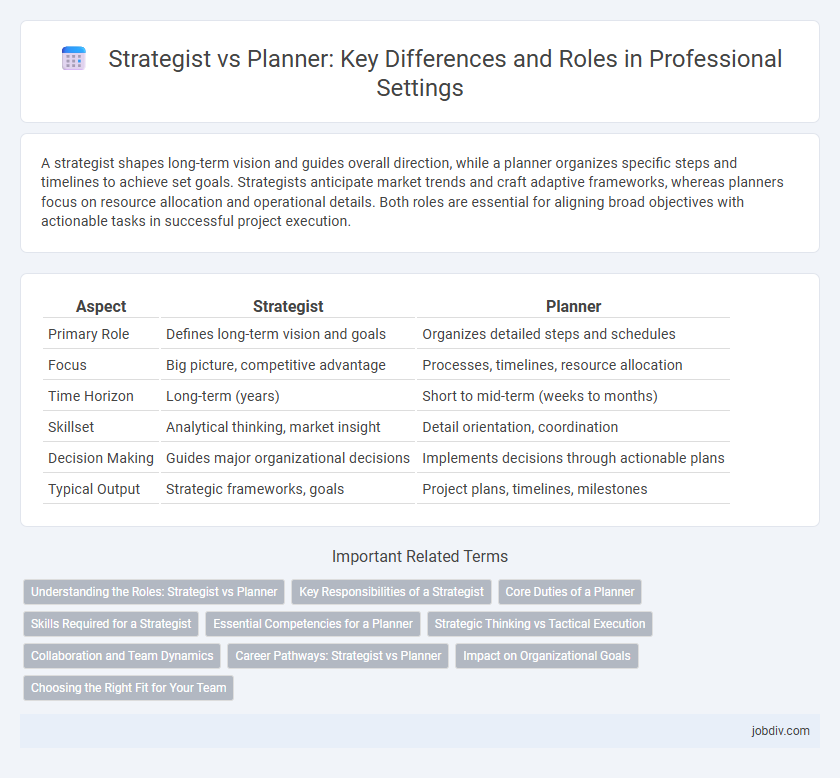A strategist shapes long-term vision and guides overall direction, while a planner organizes specific steps and timelines to achieve set goals. Strategists anticipate market trends and craft adaptive frameworks, whereas planners focus on resource allocation and operational details. Both roles are essential for aligning broad objectives with actionable tasks in successful project execution.
Table of Comparison
| Aspect | Strategist | Planner |
|---|---|---|
| Primary Role | Defines long-term vision and goals | Organizes detailed steps and schedules |
| Focus | Big picture, competitive advantage | Processes, timelines, resource allocation |
| Time Horizon | Long-term (years) | Short to mid-term (weeks to months) |
| Skillset | Analytical thinking, market insight | Detail orientation, coordination |
| Decision Making | Guides major organizational decisions | Implements decisions through actionable plans |
| Typical Output | Strategic frameworks, goals | Project plans, timelines, milestones |
Understanding the Roles: Strategist vs Planner
A strategist focuses on setting long-term goals and identifying the overarching vision that drives organizational success, utilizing market insights and competitive analysis to shape corporate direction. In contrast, a planner specializes in detailing the concrete steps, timelines, and resource allocation necessary to execute the strategy effectively, ensuring operational efficiency and alignment with strategic objectives. Understanding these distinct roles enhances collaboration and drives cohesive decision-making within professional environments.
Key Responsibilities of a Strategist
A strategist primarily focuses on defining long-term goals, analyzing market trends, and identifying competitive advantages to drive business growth. They develop actionable frameworks that align organizational objectives with market opportunities, ensuring sustainable success. Their key responsibilities include conducting comprehensive research, formulating strategic initiatives, and advising leadership on decision-making processes.
Core Duties of a Planner
Planners focus on developing detailed, actionable steps to achieve project objectives, coordinating resources, schedules, and timelines for optimal execution. Their core duties include risk assessment, resource allocation, and progress monitoring to ensure alignment with strategic goals. Effective planners maintain clear communication across teams to adapt plans dynamically and meet organizational deadlines.
Skills Required for a Strategist
A strategist requires strong analytical skills to interpret market trends and competitive landscapes, enabling data-driven decision-making. Proficiency in critical thinking and problem-solving is essential to devise innovative long-term plans that align with business objectives. Effective communication and leadership skills are crucial for articulating vision and influencing cross-functional teams toward strategic goals.
Essential Competencies for a Planner
A planner must excel in data analysis, resource allocation, and timeline management to develop actionable strategies that align with organizational goals. Proficiency in risk assessment and contingency planning is essential to anticipate challenges and optimize project outcomes. Strong communication skills enable planners to coordinate cross-functional teams and ensure timely execution of plans.
Strategic Thinking vs Tactical Execution
Strategists excel in strategic thinking by envisioning long-term goals, identifying market trends, and formulating high-level plans that align with organizational vision. Planners specialize in tactical execution, translating strategies into detailed actions, schedules, and resource allocations to achieve specific objectives efficiently. The synergy between strategic foresight and meticulous planning drives successful business outcomes and sustained competitive advantage.
Collaboration and Team Dynamics
Strategists drive vision by identifying long-term goals and aligning resources, while planners focus on actionable steps and timelines to execute those strategies. Effective collaboration between strategists and planners enhances team dynamics by fostering clear communication, shared accountability, and adaptive problem-solving. This synergy ensures that strategic objectives translate seamlessly into measurable outcomes, optimizing overall project success.
Career Pathways: Strategist vs Planner
Strategists typically focus on high-level decision-making and long-term vision within organizations, pursuing career paths in executive management, business development, and corporate strategy. Planners emphasize detailed project execution and resource allocation, often advancing through roles in project management, operations, and logistics. Understanding the distinct skill sets and responsibilities helps professionals align their career development with organizational needs and industry demands.
Impact on Organizational Goals
A strategist defines long-term vision and establishes overarching goals that shape the organization's direction, directly influencing high-level decision-making and competitive positioning. A planner translates these strategic objectives into detailed actionable plans, optimizing resource allocation and timelines to ensure efficient execution. Together, their roles enhance organizational alignment, operational effectiveness, and sustained goal achievement.
Choosing the Right Fit for Your Team
A strategist defines long-term goals and vision, aligning resources to drive competitive advantage, while a planner focuses on detailed execution, scheduling, and managing project timelines to ensure timely delivery. Choosing the right fit depends on your team's needs: if innovation and direction are priorities, a strategist offers critical foresight; for operational efficiency and structured workflows, a planner ensures consistent progress. Balancing both roles can optimize performance by blending visionary leadership with meticulous organization.
Strategist vs Planner Infographic

 jobdiv.com
jobdiv.com